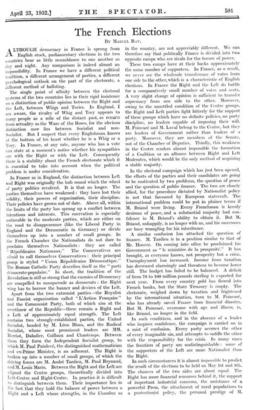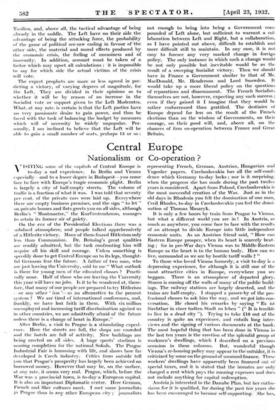The French Elections
BY M.A.RCEL RAY.
ALTHOUGH democracy in France is sprung from English stock, parliamentary elections in the two countries bear as little resemblance to one another as day and night. Any comparison is indeed almost an impossibility. In France we have a different political tradition, a different arrangement of parties, a different psychological outlook on the part of the electorate, a different method of balloting.
The single point of affinity between the electoral systems of the two countries lies in their rigid insistence on a distinction of public opinion between the Right and the Left, between Whigs and Tories. In England, I am aware, the rivalry of Whig and Tory appears to many people as a relic of the distant past, as remote from actuality as the Wars of the Roses, for the obvious distinction _ now lies between Socialist and non- Socialist. But I suspect that every Englishman. knows at the bottom of his heart whether he is a Whig or a Tory. In France, at any rate, anyone who has a vote can state at a moment's notice whether his sympathies are with the Right or with the Left. Consequently there is a stability about the French electorate which it is essential to take into account when the political problem is under consideration.
In France as in England, the distinction between Left and Right was originally the hub round which the wheel of party politics revolved. It is that no longer. The parties themselves have weakened : they have lost their solidity, their powers of organization, their discipline. Their policies have grown out of date. Above all, within the limits of the party has sprung up a conflict between intentions and interests. This enervation is especially noticeable in the moderate parties, which are either on the road to disappearance (like the Liberal Party in England and the Democratic in Germany) or divide themselves up into a number of small groups. In the French Chamber the Nationalists do not dare to proclaim themselves Nationalists : they are called " Republicains Nationaux." The Conservatives are afraid to call themselves Conservatives : their principal group is styled " Union Republicaine Democratique." The Roman Catholic Party describes itself as the " parti demoerate-populaire." In short, the tradition of the Revolution is still so strong that the enemies of Democracy are compelled to masquerade as democrats : the Right wing has to borrow the banner and devices of the Left.
Apart from the two extremist parties—the Royalist and Fascist organization called "L'Action Francaise" and the Communist Party, both of which aim at the overthrow of the Republic—there remain a Right and a Left of approximately equal strength. The Left contains two strongly-established parties, the United Socialist, headed by M. Leon Blum, and the Radical Socialist, whose most prominent leaders are MM. Herriot, Daladier, Caillaux and Chautemps. Between them they form the Independent Socialist group, to which M. Paul Painleve, the distinguished mathematician and ex-Prime Minister, is an adherent. The Right is broken up into a number of small groups, of which the driving forces are M. Andre. Tardieu, M. Paul Reynaud, and M. Louis Marin. Between the Right and the Left are aligned the Centre groups, theoretically divided into Left-Centre and Right-Centre. In practice it is difficult to distinguish between them. Their importance lies in the fact that they hold .the balance of power between a Right and a Left whose strengths, in the Chamber as in. the country, are not appreciably different. We can therefore say that politically France is divided into two opposite camps who are rivals for the tenure of power.
These two camps have at their backs approximately the same number of supporters. In France, as a result, we never see the wholesale transference of votes from one side to the other,.which is a characteristic of English elections. In France the Right and the Left do battle for a comparatively small number of votes and seats. A very slight change of opinion is sufficient to transfer supremacy from one side to the other. Moreover, owing to the unsettled condition of the Centre groups, the Right and Left parties fight bitterly for the support of these groups which have no definite policies, no party discipline, no leaders capable of imposing their will. M. Poineare and M. Laval belong to the Centre, but they are leaders of Government rather than leaders of a party. Moreover, they are members of the Senate, not of the Chamber of Deputies. Thirdly, this weakness in the Centre renders almost impossible the formation of a Coalition or an affiance between Right and Left Moderates, which would be the only method of acquiring a stable majority.
In the electoral campaign which has just been opened, the efforts of the parties and their candidates are going to be motivated by two problems, the question of peace and the question of public finance. The two arc closely allied, for the procedure dictated by Nationalist policy is not that favoured by European statecraft. The international problem could be put in plainer terms if M. Briand were living. Every Frenchman is keenly desirous of peace, and a substantial majority had con- fidence in M. Briand's ability to obtain it. But M. Briand, unhappily, is no longer with us, and his successors are busy wrangling for his inheritance.
A similar confusion has attacked the question of finance. M. Tardieu is in a position similar to that of Mr. Hoover. On coming into office he proclaimed his Government as " le ministere de la prosperity." It has brought, as everyone knows, not prosperity but a crisis. Unemployment has increased. Income from taxation has decreased alarmingly and threatens to become lower still. The budget has failed to be balanced. A deficit of from 70 to 100 million pounds sterling is expected for next year. From every country gold has flowed into French banks, but the State Treasury is empty. The electorate, weighed down by taxation and frightened by the international situation, turn to M. Poincare, who has already saved France from financial disaster. But M. Poincare, overcome with age and illness, is, like Briand, no longer in the field.
In such conditions, and in the absence of a leader who inspires confidence, the campaign is carried on in a mist of confusion. Every party accuses the other of every imaginable sin, and attempts to saddle the other with the responsibility for the crisis. In many eases the frontiers of party are undistinguishable : some of the supporters of the Left arc more Nationalist than the Right. • In such circumstances it is almost impossible to predict the result of the elections to be held on May 1st and 8th. The chances of the two sides are about equal. The Right has more financial resources behind it, the support of important industrial concerns, the assistance of a powerful . Press, the Attachment of rural •papulations to a protectionist policy, the personal prestige of M,
Tardieu, and, above all, the tactical advantage of being already in the saddle. The Left have on their side the advantage of being the attacking, force, the probability of the game of political see-saw ending in favour of the other side, the material and moral effects produced by the economic crisis, the feeling Of uneasiness and of insecurity. In addition, account must be taken of a factor which may upset all calculations : it is impossible to say for which side the actual victims of the crisis will vote.
The expert prophets are More or less agreed in .pre- dieting a victory, of varying degrees of magnitude, for the Left. They arc divided in their opinions as to whether it will be by reason of an increase in the Socialist vote or support given to the Left Moderates. What, at any rate, is certain is that the Left parties have no very passionate desire to gain- power,' and thus - be
• faced with the task of balancing the budget by measures which. 'will of necessity be Widely unpopular. Per- sonally, am inclined to believe that the Left will be able to gain a small number of seats, perhaps 15 or so :
not enough to bring into being a Government com- pounded of Left alone, but sufficient to warrant a col- laboration between Left and Right, but a collaboration, as I -have pointed out above, difficult to establish and more difficult still to maintain. In any case, it is not easy to foresee any very marked change in foreign policy; The only instance in which such a change would be not only possible but inevitable would be as the result of a sweeping Socialist victory. Then We should have in France a Government similar to that of Mr. MacDonald, Mr. Henderson and Lord Snowden. It would take up a more liberal policy on the questions of reparations and disarmament. The French Socialists themselves are not, however, expecting any such success ; even if they gained it I imagine that they would be rather embarrassed than gratified. The destinies of Europe depend far less on the result of the French elections than on the wisdom of Governments, on their courage, on their good will, and, above all, on the chances of firm co-operation between France and Great Britain.







































 Previous page
Previous page